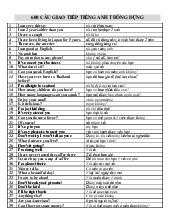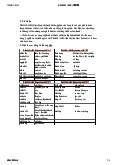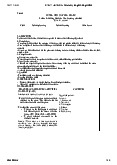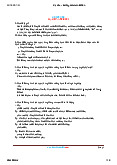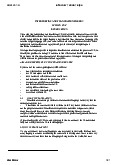



Preview text:
18:19 29/7/24
Đề reading cho tiếng anh chuyên ngành Reading test 05
Candidates of the far left and far right are the leading contenders for the country’s presidency
In october 2019 more than a million Chileans took to the streets to demand greater equality and
better public services. At least 30 people died in protests that lasted for weeks. To restore calm,
Chile’s leaders increased social spending and agreed to a process to rewrite the constitution
adopted under Augusto Pinochet, a dictator who ruled from 1973 to 1990. Members of a
constitutional convention elected in May this year, many of them leftists and political neophytes,
have begun drafting a charter that could transform the country.
Until recently it looked likely that Chile would elect a new president who shares the protesters’
goals. For months Gabriel Boric, a 35year old former student leader allied with the Communist
Party, was the frontrunner in a presidential election whose first round takes place on November
21st. (Legislative and regional elections are also scheduled for that day.) Now it seems that the
presidential race will be a hardfought
contest between him and a candidate of the far right, José
Antonio Kast, who has surged in the polls. A champion of “liberty, the rule of law and the
family”, Mr Kast would preserve Pinochet’s lowtax economic model and restore his social
conservatism. “Boric represents the demands that gave rise to the protests. But Kast represents
what happened two years after, which is that people want peace, order and security,” says
Roberto Izikson, the head of Cadem, a polling company.
The summoning of the constitutional convention did not end the upheaval, as Chileans had
hoped. On October 18th protesters marked the second anniversary of the demonstrations with
more violence. Two people died and hundreds were arrested. Last month the government also
declared a state of emergency in southern Chile in response to arson attacks, mostly against
logging companies, by some Mapuches, an indigenous group seeking greater autonomy in its
ancestral lands. This allows the government to send in the army. On November 9th it extended
the emergency after a video appeared on social media that showed heavily armed, hooded men
threatening to boot the army out. To many, a rise in immigration looks hardly less menacing.
Having demanded a new constitution, some Chileans have misgivings. They worry that it will
enshrine obligations that the state cannot afford, fuelling inflation, which has recently risen
sharply. The constitution may declare Chile to be a “plurinational” state, giving indigenous
groups more influence. Trust in the convention fell after the revelation that a farleft member had
lied about having cancer, which was a central theme of his campaign. One poll shows that its
approval rating has dropped by almost 15 percentage points since July (though it remains more
popular than other political institutions).
Mr Boric would put the presidential palace on the side of the protesters and their allies in the
constitutional convention. He would scrap the model for public services introduced by the
Pinochet regime, which gives private providers a large role. He would forgive all student debt, about:blank 1/4 18:19 29/7/24
Đề reading cho tiếng anh chuyên ngành
abolish private pension funds and make public transport free and green. Children as young as 14
would be able to change their gender on documents; schools would be equipped with condom
dispensers; “at least” 1% of jobs in the public sector would be reserved for trans people. Mr
Boric would raise taxes by a massive eight percentage points of gdp in as few as six years.
There are more moderate candidates among the seven running for the presidency, notably
Sebastián Sichel on the centre-right and Yasna Provoste on the centreleft. But they have so far
failed to prosper. Slammed for leftwing looniness, Mr Boric himself has become more
moderate. He no longer favours an amnesty for illegal immigrants or a requirement that half the
members of corporate boards must be workers. But his Communist allies will impede his move
to the centre. Although Mr Boric criticised violence on the anniversary of the protests, some of
his coalition partners joined the rally.
This gives an opening to Mr Kast, whose remedy for Chile’s woes mixes nationalism, law and
order and proposals to slash taxes and regulation. A lawyer who broke with an established party
to found his own Republican Party (echoing the name of Donald Trump’s), he proposes to dig
ditches on Chile’s northern border to deter undocumented migrants and establish an agency
modelled on the United States’ Immigration and Customs Enforcement. Mr Kast denounces the
protesters of 2019 as vandals. He wants to beef up the government’s powers during states of
emergency. This month he provoked a furore by comparing Pinochet favourably with
Nicaragua’s leftwing strongman, Daniel Ortega. (He says his comments were taken out of context.)
A devout Catholic and father of nine children, Mr Kast opposes legalising samesex marriage and
wants to ban abortion (which is legal only in very few cases). Most of all, he opposes the
unsettling changes that the protests threaten to bring about. “We’re not going to transform
anything radically,” his manifesto declares. If he wins, he may clash with the architects of the new constitution.
There is much in Mr Kast’s conservatism to put voters off. Elderly and lowincome voters, who
make up his base, like his line on law and order but may be less enthusiastic than he is to restrict
the state’s role in providing public services. But he has been deft in persuading hesitant voters
that he is not such a scary guy. He puts out selfdeprecating TikTok videos. In an interview with
a gay leftist YouTuber he jovially rolled a condom onto a banana.
“These elections are the hardest to predict since the return to democracy,” says Carmen Le
Foulon, the head of polling at the Centre of Public Studies, a thinktank. After trouncing his
opponents in the first two debates Mr Kast faltered in the third, on November 15th. His rivals
laid into him for downplaying Pinochet’s crimes, for opposing gay marriage and for sending
mixed signals on whether his government would build coalfired power plants. Mr Kast’s charm deserted him.
That gives new hope to Mr Boric, and perhaps to one of the more moderate candidates. A lot
depends on young voters, who were an important factor in the referendum last year that endorsed
the rewriting of the constitution. They are likely to favour Mr Boric and Ms Provoste. If those about:blank 2/4 18:19 29/7/24
Đề reading cho tiếng anh chuyên ngành
two go to the second round in December, the protesters’ agenda will have survived the backlash they provoked.
Please read the article below and do the exercises that follow. I. Words and expressions
Explain the meaning of each underlined word or expression as used in the article (10 points):
1. a hardfought contest: difficult competition
2. Slammed for leftwing looniness
3. beef up the government’s powers: stengh the ability of administration
4. puts out selfdeprecating TikTok videos: humble and critical Tiktok video of himself
5. survived the backlash they provoked: sống sót mặc dù cái backlash: overcome the strong negative reaction
II. Comprehension questions
Answer the following questions in your own words (15 points):
1. What did the Chile’s leaders do to restore calm after the protests?
To restore calm, Chile's leaders increased social spending and agreed to a process to rewrite
the constitution adopted under Augusto Pinochet, a dictator who ruled from 1973 to 1990.
Members of a constitutional convention elected in May this year, many of them leftists and
political neophytes, have begun drafting a charter that could transform the country.
2. What did damage did the protesters cause and how did the government deal with it?
Hai người chết và hàng trăm người bị bắt. Tháng trước, chính phủ cũng đã ban bố tình trạng
khẩn cấp ở miền nam Chile để đối phó với các cuộc tấn công đốt phá, chủ yếu nhằm vào các
công ty khai thác gỗ, của một số người Mapuches, một nhóm bản địa tìm kiếm quyền tự chủ
lớn hơn ở vùng đất tổ tiên của họ. Điều này cho phép chính phủ gửi quân đội. Vào ngày 9
tháng 11, họ đã mở rộng tình trạng khẩn cấp sau khi một video xuất hiện trên phương tiện
truyền thông xã hội cho thấy những người đàn ông đội mũ trùm đầu được trang bị vũ khí dày
đặc đe dọa khởi động quân đội. Đối với nhiều người, sự gia tăng nhập cư có vẻ ít đe dọa hơn
3. How did Chileans respond to the situation?
Sau khi yêu cầu một hiến pháp mới, một số người Chile đã nghi ngờ. Họ lo lắng rằng nó sẽ bao
hàm các nghĩa vụ mà nhà nước không thể chi trả, thúc đẩy lạm phát, vốn đã tăng mạnh gần
đây. Hiến pháp có thể tuyên bố Chile là một quốc gia “đa quốc gia”, mang lại cho các nhóm
bản địa nhiều ảnh hưởng hơn. Niềm tin vào đại hội giảm sau khi tiết lộ rằng một thành viên xa about:blank 3/4 18:19 29/7/24
Đề reading cho tiếng anh chuyên ngành
xôi đã nói dối về việc mắc bệnh ung thư, vốn là chủ đề chính trong chiến dịch của anh ta. Một
cuộc thăm dò cho thấy xếp hạng chấp thuận của nó đã giảm gần 15 điểm phần trăm kể từ tháng
Bảy (mặc dù nó vẫn phổ biến hơn các thể chế chính trị khác).
4. What are the main differences in the strategies of Boris and Kast?
ông Kast sẽ bảo tồn mô hình kinh tế thuế thấp của Pinochet và khôi phục chủ nghĩa bảo thủ xã
hội của mình. “Boric đại diện cho những yêu cầu đã dẫn đến các cuộc biểu tình. Nhưng Kast
đại diện cho những gì đã xảy ra hai năm sau, đó là mọi người muốn hòa bình, trật tự và an
ninh, ”Roberto Izikson, người đứng đầu Cadem, một công ty thăm dò ý kiến, nói.
Mr. Kast's policy is more conservative and traditional than Boris's. Boris supports transgender
people and allows gender change on paper. Mr. Kast criticized same-sex marriage and abortion
5. Who is having more advantage and why? Gabriel Boric
ông Kast đã chùn bước trong cuộc tranh luận thứ ba, vào ngày 15 tháng 11. Các đối thủ của anh ta
đã sa vào anh ta vì đã hạ thấp tội ác của Pinochet, vì phản đối hôn nhân đồng tính và gửi những tín
hiệu hỗn hợp về việc liệu chính phủ của anh ta có xây dựng nhà máy điện đốt than hay không. Sự
quyến rũ của Mr Kast đã bỏ rơi anh ta. III. Summary
Summarize the article in about 120-150 words (10 points). IV. Translation
Translate “Having demanded…” to “…as few as six years” (10 points).
Một cuộc thăm dò cho thấy tín nhiệm đã giảm gần 15 điểm phần trăm kể từ tháng Bảy (mặc dù
nó vẫn phổ biến hơn các thể chế chính trị khác).
Ông Boric sẽ đặt dinh tổng thống về phía những người biểu tình và các đồng minh của họ trong
đại hội hiến pháp. Ông sẽ loại bỏ mô hình cho các dịch vụ công do chế độ Pinochet đưa ra, vốn
mang lại cho các nhà cung cấp tư nhân một vai trò lớn. Ông sẽ bãi bỏ cho tất cả các khoản nợ
của sinh viên, các quỹ hưu trí tư nhân và làm cho giao thông công cộng trở nên xanh và miễn
phí. Trẻ em dưới 14 tuổi sẽ có thể thay đổi giới tính của mình trên giấy tờ; trường học sẽ được
trang bị máy rút bao cao su; "Ít nhất" 1% công việc trong khu vực công sẽ được dành cho những
người chuyển giới. Ông Boric sẽ tăng thuế lên 8 điểm phần trăm gdp trong vòng sáu năm tới about:blank 4/4
